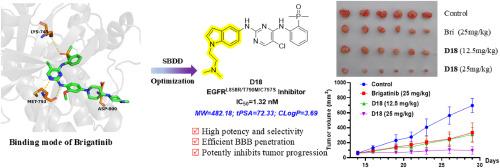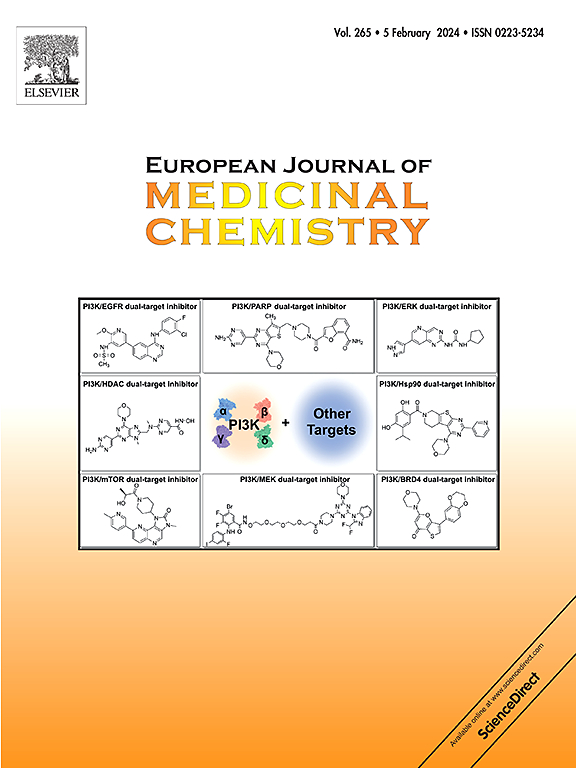Discovery of a Brain-Penetrant Fourth-Generation EGFR Inhibitor to Overcome the Human Triple (L858R/T790M/C797S) Mutation
IF 5.9
2区 医学
Q1 CHEMISTRY, MEDICINAL
引用次数: 0
Abstract
Brain metastasis remains a major challenge in lung cancer treatment because most small-molecule targeted therapies are severely limited in their efficacy against brain metastasis by efflux transporters on the blood-brain barrier (BBB). Osimertinib has been approved as the first-line treatment for EGFR-mutated non-small cell lung cancer (NSCLC) and exhibits good brain penetration. However, clinical resistance to Osimertinib mediated by the tertiary C797S mutation remains an unmet medical need. Here, we report a series of brigatinib derivatives, rationally designed as fourth-generation EGFR inhibitors. The representative compound D18 exhibits potent inhibitory activity against EGFRL858R/T790M/C797S, with an IC50 of 1.32 nM, and significantly inhibits the proliferation of the NCI-H1975 cell line harboring EGFRL858R/T790M/C797S, with an IC50 of 0.87 μM. In addition, compound D18 exhibits a favorable pharmacokinetic profile and excellent BBB permeability. It significantly inhibits tumor growth in the NCI-H1975 xenograft tumor model. Based on its excellent in vitro and in vivo properties, compound D18 can be considered a promising candidate for the treatment of EGFR L858R/T790M/C797S triple mutations and brain metastases.

发现一种脑渗透第四代EGFR抑制剂来克服人类三重(L858R/T790M/C797S)突变
脑转移仍然是肺癌治疗的主要挑战,因为大多数小分子靶向治疗对血脑屏障(BBB)外排转运体脑转移的疗效严重有限。奥西替尼已被批准作为egfr突变的非小细胞肺癌(NSCLC)的一线治疗药物,并具有良好的脑穿透性。然而,由第三代C797S突变介导的临床对奥西替尼的耐药仍然是一个未满足的医疗需求。在这里,我们报告了一系列布加替尼衍生物,合理设计为第四代EGFR抑制剂。具有代表性的化合物D18对EGFRL858R/T790M/C797S具有较强的抑制活性,IC50值为1.32 nM,对携带EGFRL858R/T790M/C797S的NCI-H1975细胞株的增殖具有显著抑制作用,IC50值为0.87 μM。此外,化合物D18具有良好的药代动力学特征和良好的血脑屏障通透性。在NCI-H1975异种移植肿瘤模型中显著抑制肿瘤生长。基于其良好的体外和体内特性,化合物D18可以被认为是治疗EGFR L858R/T790M/C797S三重突变和脑转移的有希望的候选者。
本文章由计算机程序翻译,如有差异,请以英文原文为准。
求助全文
约1分钟内获得全文
求助全文
来源期刊
CiteScore
11.70
自引率
9.00%
发文量
863
审稿时长
29 days
期刊介绍:
The European Journal of Medicinal Chemistry is a global journal that publishes studies on all aspects of medicinal chemistry. It provides a medium for publication of original papers and also welcomes critical review papers.
A typical paper would report on the organic synthesis, characterization and pharmacological evaluation of compounds. Other topics of interest are drug design, QSAR, molecular modeling, drug-receptor interactions, molecular aspects of drug metabolism, prodrug synthesis and drug targeting. The journal expects manuscripts to present the rational for a study, provide insight into the design of compounds or understanding of mechanism, or clarify the targets.

 求助内容:
求助内容: 应助结果提醒方式:
应助结果提醒方式:


